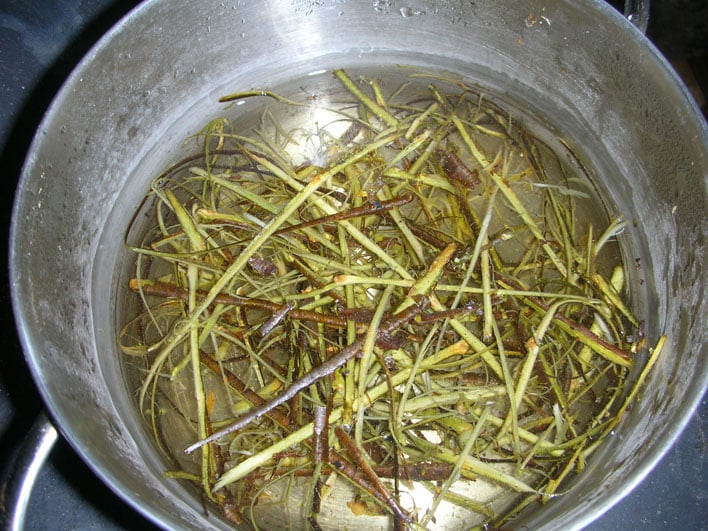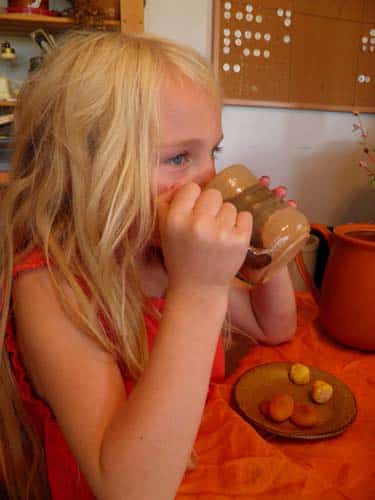Teas…infusions….decoctions…what’s the difference between these water based herbal remedies?
When should you make one over the other? Does it even matter?
In past articles, I’ve written about making herbal teas and making herbal infusions.
Today I’m going to tell you all about herbal decoctions.
What are decoctions?

Herbal decoctions are an herbal preparation that is made by gently simmering herbs in water on the stove for a limited amount of time, generally about 20 minutes, though sometimes they are decocted for a shorter or longer period of time.
When are decoctions used?

Just as teas and infusions are used with softer plant parts such as leaves, flowers, and stems, decoctions are used with harder plant parts such as roots, bark, seeds, and nuts, as well as hard fungi such as reishi, turkey tails, and chaga.
Sometimes hard berries such as Hawthorn, Rose hips, or Elderberries (dried)
Because these parts of the plant are harder, they require more effort to extract their medicine.
By simmering them, the cell walls are broken down, releasing the constituents.
Both fresh and dried herbs can be used for a decoction.
If you are decocting with fresh herbs, it’s best to double or triple the amount of herb you would use if dried to account for the extra moisture in the fresh herb.
For instance, if you were going to simmer 1 tablespoon of dried Elderberries in 8 ounces of water, you would increase it to 2-3 tablespoons of Elderberries in 8 ounces of water.
What are decoctions used for?

Decoctions can be used similarly to teas and infusions whenever a beverage is wanted as an herbal remedy.
They can also be used as a base for making other remedies such as syrups, cough drops, or a double extract (when an herb is decocted then tinctured in alcohol).
How to make an herbal decoction.

Making herbal decoctions are as easy as making herbal teas and infusions.
You will want to start with cold water, and place the water and herbs into a saucepan on the stove.
Depending on the herb, you will want to add 1-3 tablespoons of herb per 8 ounces of water.
Bring the mixture to a gentle boil, turn down the heat, cover with a lid and simmer for 15-20 minutes.
Sometimes a recipe will call for an herb to be decocted by half. For instance, if you start with 16 ounces of water, you will simmer your decoction until the liquid is reduced to 8 ounces.
Some herbs that decoct well.

The list of herbs that can or should be decocted is quite extensive.
One thing to keep in mind is if an herb has a lot of volatile oils, you would be better off creating a tea or infusion than a decoction.
Valerian is a great example of this. The root is highly aromatic (some would say it smells like stinky socks), and is better made as a tea than a decoction.
The following is a list of herbs that are best made as decoctions:
Ashwagandha
Astragalus
Black Pepper
Blackberry (root)
Burdock (root)
Cacao
Calamus
Cardamom
Chicory (root)
Cinnamon
Clove
Coriander
Crampbark
Cranberry
Cumin
Dandelion (root)
Echinacea (root)
Elderberry
Elecampane (root)
Eleuthero
Fennel
Ginger
Gravel Root
Hawthorn (berry)
Licorice
Maitake
Marshmallow (root)
Milk Thistle
Mustard
Nutmeg
Oyster Mushroom
Raspberry (root)
Reishi
Rose (hips)
Saw Palmetto
Turkey Tail
Turmeric
Wild Cherry
Wild Ginger
Willow
Witch Hazel
Yellow Dock
One of my favorite decoction blends

I love tea! I cannot drink coffee and I do not drink soda so I like to mix up my day with a variety of tea blends.
One of my favorite blends is a Dandelion Burdock Chai blend.
Add a bit of honey to sweeten and a splash of your favorite milk to make this a delicious beverage that even kids will like.
Spend an afternoon with your kids, blending together this blend, adding or adjusting the blend to suit your tastes.
1 cup total of roasted Chicory root, Burdock root, and/or Dandelion root
6 tablespoons Fennel or Anise seed
1 tablespoon Cloves
1 tablespoon green Cardamom pods
6 Cinnamon sticks
2 Tbsp dried Ginger root
1 1 /2 tsp black Peppercorns
12 Bay leaves broken into pieces
1 cup water
Crush the Cardamom pods and the Cinnamon sticks with a mortar and pestle.
Mix the ingredients together in a quart jar, shaking and stirring until well mixed. Label your jar.
To make the chai:
Add 1 tbsp mixture per cup of water, simmer for 5-10 minutes then steep for 10 minutes.
Add 1 Tbsp honey per cup. Add 2 Tbsp milk or cream per cup and stir.

Hopefully this is helpful for when and how to make a decoction and gives you the confidence to make some with your children.
Herbal decoctions are easy to make and are another great tool to have on hand for making your own herbal remedies.
Have you ever made an herbal decoction? I’d love to hear your stories!

